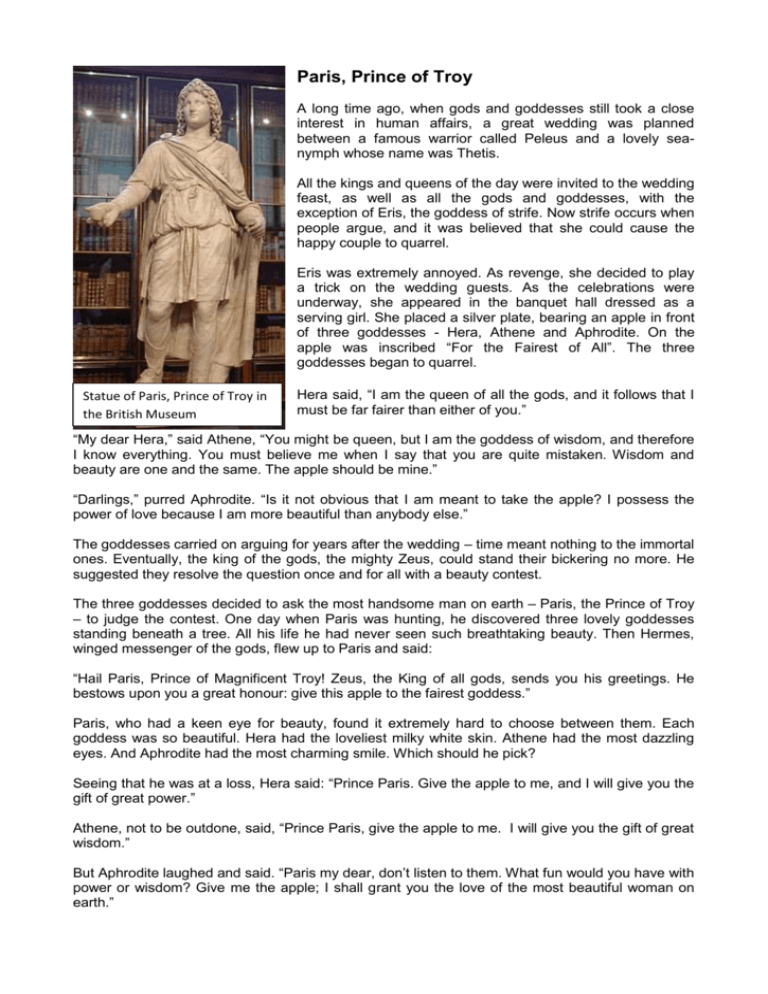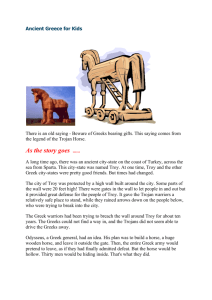Troy1 - Ms Patton's Page
advertisement

Paris, Prince of Troy A long time ago, when gods and goddesses still took a close interest in human affairs, a great wedding was planned between a famous warrior called Peleus and a lovely seanymph whose name was Thetis. All the kings and queens of the day were invited to the wedding feast, as well as all the gods and goddesses, with the exception of Eris, the goddess of strife. Now strife occurs when people argue, and it was believed that she could cause the happy couple to quarrel. Eris was extremely annoyed. As revenge, she decided to play a trick on the wedding guests. As the celebrations were underway, she appeared in the banquet hall dressed as a serving girl. She placed a silver plate, bearing an apple in front of three goddesses - Hera, Athene and Aphrodite. On the apple was inscribed “For the Fairest of All”. The three goddesses began to quarrel. Statue of Paris, Prince of Troy in the British Museum Hera said, “I am the queen of all the gods, and it follows that I must be far fairer than either of you.” “My dear Hera,” said Athene, “You might be queen, but I am the goddess of wisdom, and therefore I know everything. You must believe me when I say that you are quite mistaken. Wisdom and beauty are one and the same. The apple should be mine.” “Darlings,” purred Aphrodite. “Is it not obvious that I am meant to take the apple? I possess the power of love because I am more beautiful than anybody else.” The goddesses carried on arguing for years after the wedding – time meant nothing to the immortal ones. Eventually, the king of the gods, the mighty Zeus, could stand their bickering no more. He suggested they resolve the question once and for all with a beauty contest. The three goddesses decided to ask the most handsome man on earth – Paris, the Prince of Troy – to judge the contest. One day when Paris was hunting, he discovered three lovely goddesses standing beneath a tree. All his life he had never seen such breathtaking beauty. Then Hermes, winged messenger of the gods, flew up to Paris and said: “Hail Paris, Prince of Magnificent Troy! Zeus, the King of all gods, sends you his greetings. He bestows upon you a great honour: give this apple to the fairest goddess.” Paris, who had a keen eye for beauty, found it extremely hard to choose between them. Each goddess was so beautiful. Hera had the loveliest milky white skin. Athene had the most dazzling eyes. And Aphrodite had the most charming smile. Which should he pick? Seeing that he was at a loss, Hera said: “Prince Paris. Give the apple to me, and I will give you the gift of great power.” Athene, not to be outdone, said, “Prince Paris, give the apple to me. I will give you the gift of great wisdom.” But Aphrodite laughed and said. “Paris my dear, don’t listen to them. What fun would you have with power or wisdom? Give me the apple; I shall grant you the love of the most beautiful woman on earth.” Paris then knew what to do. He had long been in love with Helen, the most beautiful woman on earth. She was married to King Menelaus and the prince had thought up that his love was beyond hope. Thus Aphrodite won the apple. As she giggled with delight, the other goddesses stormed back to Zeus and complained bitterly. Zeus had a feeling that trouble was in store for humankind. Paris set sail for the land of Sparta where King Menelaus ruled. Menelaus welcomed the famous prince into his palace, and while the two sat, Queen Helen came in looking as lovely as a rose. The maid-servants brought her a seat and covered it with a soft wool rug. She glanced at the visiting prince, and asked her husband the King: “Shall I guess the name of this prince? I have heard tales of a prince from far-away Troy, who is famed for his looks. Is he Paris, Prince of Troy?” “My dear,” said King Menelaus, “As always, you are right. It is the Prince of Troy who honours us with a visit.” With a nod, Prince Paris shyly acknowledged Queen Helen. That night, they feasted and made merry. While King Menelaus was busy laughing with his generals, Paris spoke softly to Helen. “Most beautiful queen,” he said, “I beg you to meet me tonight in the orchard beneath the palace walls and we shall sail together for Troy. You will find it a most magnificent city.” Because the goddess of love, Aphrodite, had wished it so, Helen could not help but fall for Paris. After King Menelaus discovered that his wife had ran away with his guest, he swore before the gods that that he would exact the most terrible revenge on Prince Paris and the city of Tory. He went to see his elder brother, King Agamemnon: “My dear brother, our honour has been damaged by this foreign peacock, this perfumed boy. Let us gather all the kings of Greece and attack Troy together.” But Agamemnon knew better than to rush headlong into battle. He convinced his brother to send an ambassador to Troy to request the return of Queen Helen. He knew that Prince Paris’ father, King Priam of Troy, was a reasonable man. Thus, in the name of peace and reconciliation, a messenger was dispatched. Prince Paris refused to return the lovely Queen, saying that they had been brought together by Aphrodite herself. King Agamemnon, the brother of the wronged King Menelaus, finally agreed to summon all the kings of Greece. They prepared a navy of a thousand ships, the greatest military force to ever set sail. Thus began the war between the Greeks and the Trojans.







